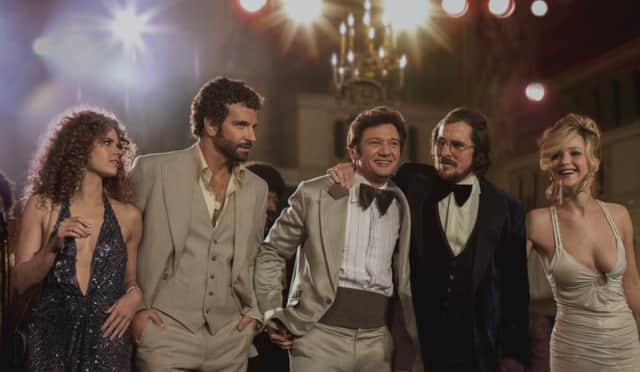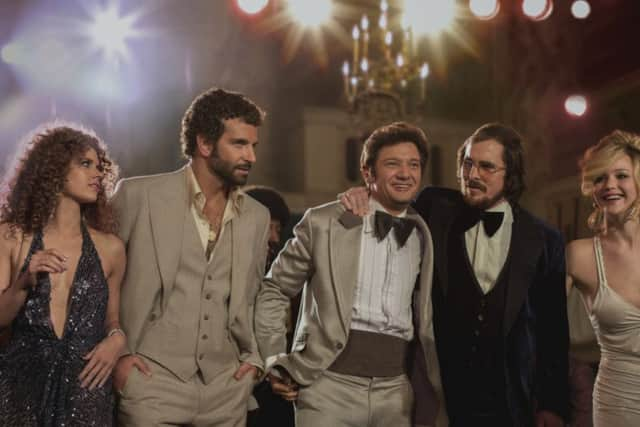Film review: American Hustle


Star rating: * * * * *
Certificate 15
Written by Russell and Eric Singer, and boasting a dizzying number of set-ups and reversals, it finds the director continuing his ongoing mission to rehabilitate played-out movie genres by infusing them with the exuberance and raw emotion of real life in all its magnificently messy glory.


American Hustle may be a con- artist movie of the type popularised by The Sting (and playfully updated by Russell’s contemporary Steven Soderbergh via his goofily entertaining Oceans movies and the underrated The Informant!), but it’s a con-artist movie in the same way that Russell’s own Silver Linings Playbook was a rom-com and The Fighter was a boxing flick. Which is to say: it uses the familiar tropes of the genre – the complicated minutiae of the con, the never-quite-sure-who-is-playing-who nature of the characters – as hooks to reel us into a more complex tale of family dysfunction, divided loyalties, love and friendship that is so attuned to the characters’ inner lives that their emotions seem to bleed through the screen.
Advertisement
Hide AdThe first superlative trick Russell pulls off, though, is to con us into believing we’re watching a Martin Scorsese movie. Full of crash cuts, super-fast dolly shots, three different voiceovers and plenty of period pop music cranked up way too loud on the soundtrack, the early sequences feel very much like karaoke Casino or an ersatz version of Goodfellas. In anyone else’s hands such blatant riffing would be cause for concern, but it’s part of the film’s overall formal brilliance that in setting up the criminal milieu of Bale’s Irving Rosenfeld and Adams’ Sydney Prosser, Russell deliberately echoes Scorsese to reinforce the inauthentic nature of their fraudulent lives.
The world of American Hustle is one of cheap suits and stolen dresses, bad toupees and roller-curled hair, sunlamp-scarred skin and toxic nail polish – and Russell makes a virtue of all of it, gradually peeling away layer upon layer of movie gloss to both expose such surface fakery and mirror the way his characters’ own fictions begin unraveling around them as their lies get further out of hand.
That starts to happen the moment Irving and Sydney are ensnared by the FBI. Having worked up a low-key money-lending racket, they find their skills in demand by a loose-canon FBI agent called Richard DiMasso (Bradley Cooper) after he busts them for fraud.
Dangling immunity in their face in return for helping him hook some bigger fish, DiMasso has his eye on securing a little fame and career advancement by capitalising on the post-Watergate mood of the country to bring down corrupt politicians, among them the mayor of New Jersey, sympathetically played by Jeremy Renner. DiMasso, however, is too blinded by hubris to understand that the bigger the prize, the more uncontrollable the variables become, which is why Sydney and Irving find themselves corralled into pulling off bigger and bigger scams that force them to up their own criminality.
That’s the basic plot, and Russell niftily subverts the format by having law enforcement officials, rather than Sydney and Irving, putting in motion the film’s big con. But the real pleasure of the film comes from the way Russell uses the mechanics of a con movie as a way into exploring the lies and fictions these characters have to perpetrate on a daily basis just to negotiate their tricky emotional lives.
Sydney and Irving, for instance, are deeply in love, but their relationship is complicated by Irving’s loyalty to his adopted son and passive-aggressive wife (another remarkable turn from Jennifer Lawrence).
Advertisement
Hide AdSydney, too, has her own issues and for the duration of her dealings with the FBI she also has to maintain the pretence of a fabricated British identity – something that DiMasso (whose own domestic situation provides us with some sense of where his vaulting ambition comes from) finds exotic and intoxicating.
This naturally makes you question everyone’s motives and loyalty, and while that’s part of the fun of any movie like this, what makes this one so remarkable is the space Russell provides his actors. Where other filmmakers (Scorsese included) might cut to the next scene after a significant confrontation, Russell hangs back to let us see his characters responding to plot developments in the way that actual human beings might if suddenly confronted with such tumult in their lives.
He’s rewarded with uniformly great performances – with Adams, in particular, delivering the finest of the year in what is the now the year’s last great movie.
Review by Alistair Harkness